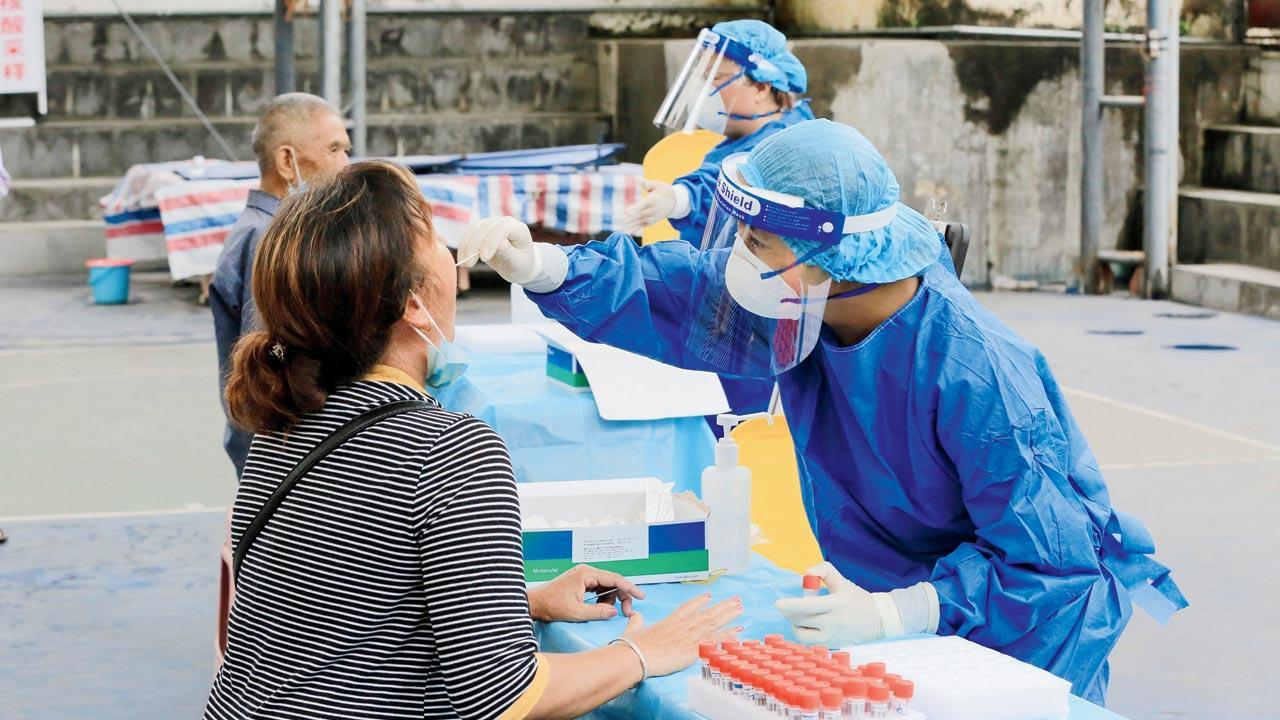Study by eminent scientists from around the world notes that a laboratory accident ‘cannot be entirely dismissed’, but there is zero evidence for such a lab origin of the virus behind the pandemic

A woman is given a nucleic acid test for COVID in Dehong Dai Prefecture. Pics/AFP
SARS-CoV-2, which causes COVID-19, most likely spread from an animal source to humans, and did not leak from a laboratory in Wuhan, China, according to a review of existing scientific evidence by a global team of scientists. The yet-to-be published study, posted on the pre-print server Zenodo on July 7, noted that while a laboratory accident “cannot be entirely dismissed”, there currently exists zero evidence for such a lab origin of the virus behind the COVID-19 pandemic.
ADVERTISEMENT
Amid a global debate around the origins of the deadly virus, 21 eminent scientists from universities and research institutes around the world reviewed the current scientific evidence to help clarify the source of the virus.
A deserted motorway in Ho Chi Minh City in Vietnam on Friday during a two-week lockdown
“Our careful and critical analysis of the currently available data provided no evidence for the idea that SARS-CoV-2 originated in a laboratory,” Professor Edward Holmes from the University of Sydney in Australia said in a statement.
“There is no evidence that any early cases had any connection to the Wuhan Institute of Virology (WIV), in contrast to the clear epidemiological links to animal markets in Wuhan,” the authors of the paper noted.
Vaccines continue to be the best current arsenal against the virus. A person gets a dose of Russia’s Sputnik Lite vaccine at the Olympic Luzhniki football stadium in Moscow on Friday. Pic/AFP
There is also “no evidence that the WIV possessed or worked on a progenitor of SARS-CoV-2 prior to the pandemic,” they added. The authors also noted, there is substantial body of scientific evidence supporting a zoonotic origin for SARS-CoV-2. “While the possibility of a laboratory accident cannot be entirely dismissed, and may be near impossible to falsify, this conduit for emergence is highly unlikely relative to the numerous and repeated human animal contacts that occur routinely in the wildlife trade,” they wrote in the paper. The team included researchers from the University of Edinburgh, the UK; University of Saskatchewan, Canada; California Berkeley, Pennsylvania State, US; Otago in New Zealand, Jiaotong-Liverpool, China, and other top global institutions.
2019
Year [in Dec] Wuhan reported first cases
‘Don’t end lockdown measures in UK’
Over 100 scientists and medics, including Indian-origin experts, issued a joint letter on Thursday, warning the UK government against a ‘dangerous and unethical’ experiment of ending all legal lockdown restrictions from July 19. The 122 signatories of the letter published in The Lancet warn an exponential growth of the deadly virus will likely continue until millions more are infected, leaving hundreds of thousands with long-term illness and disability.
US officials say no boosters yet
US drugmaker Pfizer and Germany’s BioNTech said they will seek regulatory authorisation for a third dose of their vaccine. The companies are developing a booster shot to target the delta variant. But top US federal agencies said Americans don’t need boosters yet and it was not up to the companies alone to decide when they might be needed.
Also Read: Inside Mumbai’s biggest Covid care hospital
This story has been sourced from a third party syndicated feed, agencies. Mid-day accepts no responsibility or liability for its dependability, trustworthiness, reliability and data of the text. Mid-day management/mid-day.com reserves the sole right to alter, delete or remove (without notice) the content in its absolute discretion for any reason whatsoever
 Subscribe today by clicking the link and stay updated with the latest news!" Click here!
Subscribe today by clicking the link and stay updated with the latest news!" Click here!






